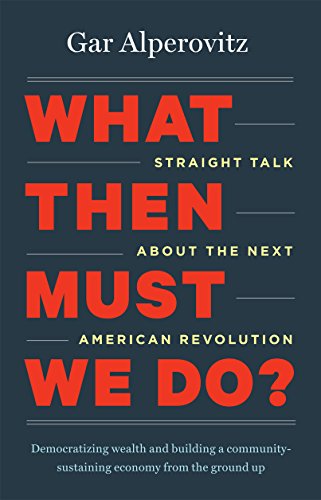
What Then Must We Do?
Straight Talk about the Next American Revolution
کتاب های مرتبط
- اطلاعات
- نقد و بررسی
- دیدگاه کاربران
نقد و بررسی

March 11, 2013
Alperovitz (America Beyond Capitalism), a University of Maryland political economist and cofounder of the Democracy Collaborative, transcends simple political disenchantment to examine the intertwining of political and economic power and the need to develop new institutions that help the 99% obtain more of both. The atypical conditions that made possible the postwar boom fostered the development of institutions that now are losing strength. With a nod to Tolstoy, Alperovitz encourages the reader to ponder how to redress the staggeringly unequal distribution of wealth. His survey of the American landscape highlights co-ops, employee stock ownership plans, publicly owned utilities and hospitals, and other already-successful alternatives to the for-profit corporate model. By so doing, he persuasively argues, new constituencies tied to these alternative models will emerge. His emphasis throughout is on the local level, as if to emphasize the movement toward a new American community that he espouses. The reader is certain to find his views challenging, even if the schism between conventional corporatism and “New Economy” practices that Alperovitz envisions seems to evoke the gulf between Dr. Jekyll and Mr. Hyde.

May 1, 2013
Alperovitz (political economy, Univ. of Maryland; America Beyond Capitalism) alternately elicits hope and despair in his discussion of the state of America's current economic system--despair because he believes it no longer works and hope in the spreading economic democratization and successful cooperatives and progressive local government ventures. Alperovitz states that corporate politics and policies that deliberately transfer wealth from the poor and middle class to the wealthy, not to mention the sustained attack on labor unions, demonstrate that the American social system is fundamentally broken. He asserts that early 20th-century progressivism, the New Deal, and the Great Society helped save America in times of crisis, and that a new paradigm in which social, environmental, and democratic policies reside at the forefront of our political and economic development is needed. VERDICT Alperovitz's sophisticated tone both informs and engages. Recommended for all readers interested in an economic and political perspective of what's gone wrong with America.--Duncan Stewart, Univ. of Iowa Libs., Iowa City
Copyright 2013 Library Journal, LLC Used with permission.

April 15, 2013
With the gulf between the wealthy haves and unwealthy have-nots growing year by year in America, more and more people are becoming disenchanted with so-called free-market capitalism. Political economist Alperovitz takes the pulse of this collective fiscal dissatisfaction here and offers some tantalizing but well-grounded ideas about closing the income gap without sliding into socialism. The author begins by deconstructing politics as usual and deflating the notion that progressive policies can provide much real guidance. Because banks are more stable these days, major crises like the recent recession are also unlikely to provoke much transformation. According to Alperovitz, something different beyond token protests and special-interest groups is necessary for true systemic change, and this difference comes in the form of more worker-owned and -operated companies, neighborhood corporations, and locally run public enterprises. Alperovitz's deliberately informal, conversational style makes normally rarefied economic concepts accessible to a wide audience, enhancing his inspiring message that, with the right strategies, a wholesale economic revolution is not only possible but achievable by well-organized, average citizens.(Reprinted with permission of Booklist, copyright 2013, American Library Association.)

























دیدگاه کاربران